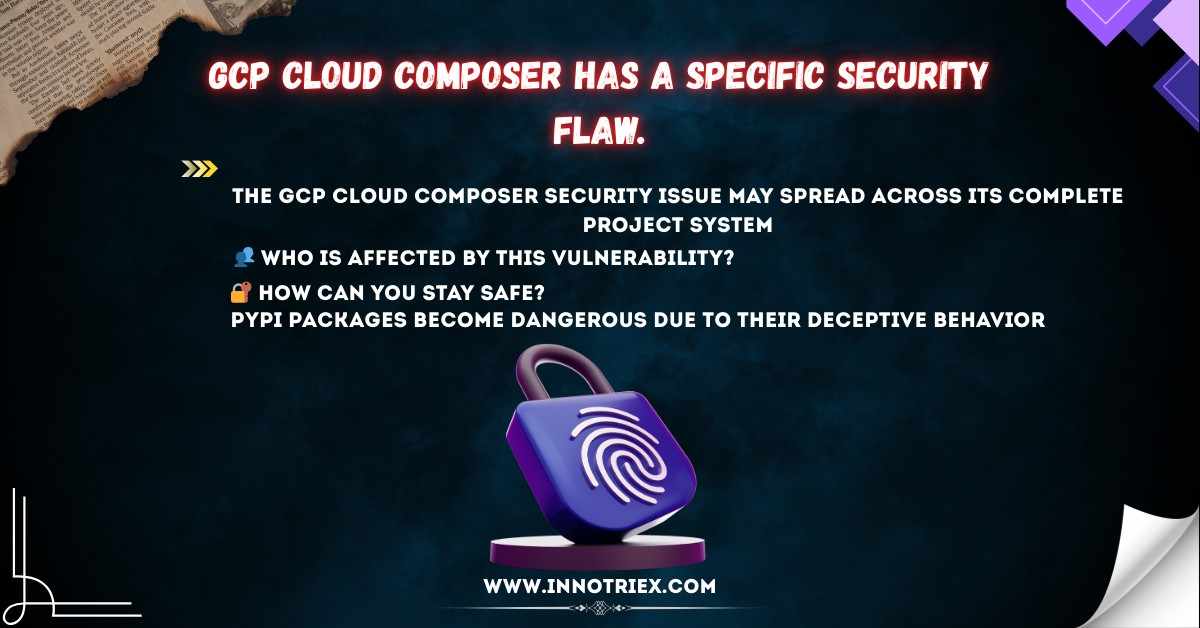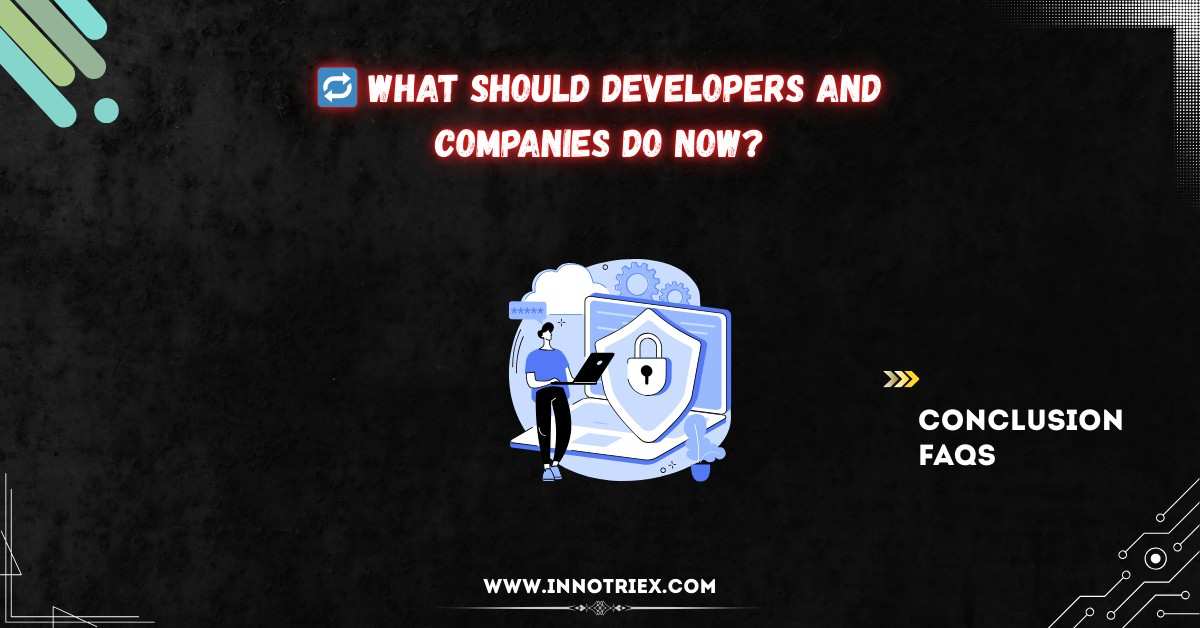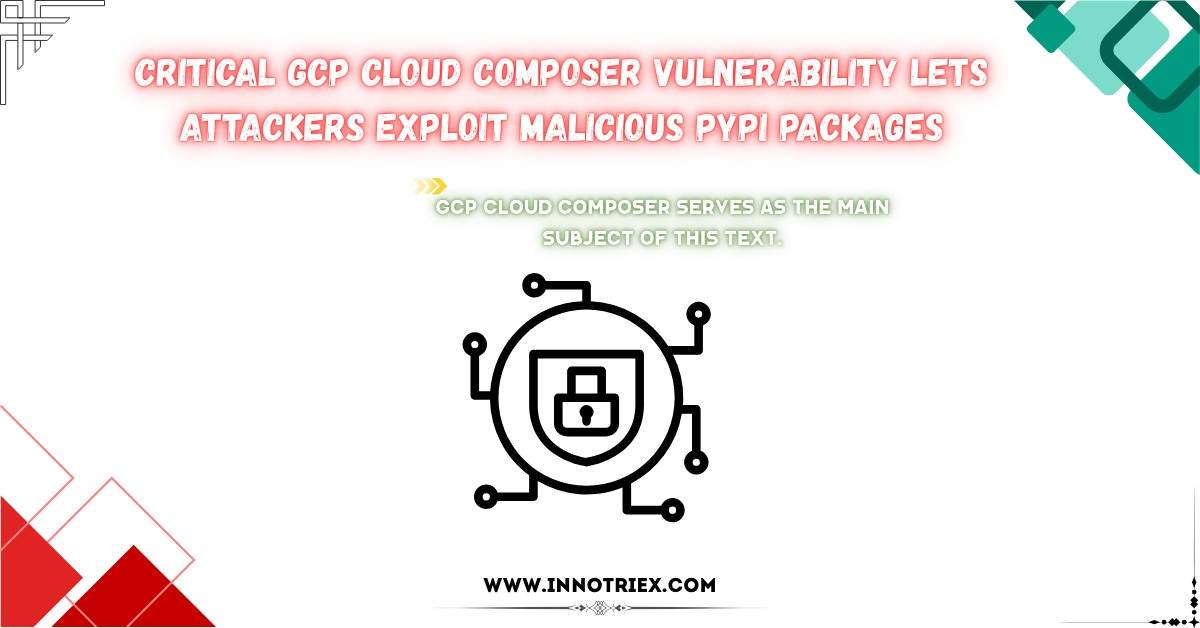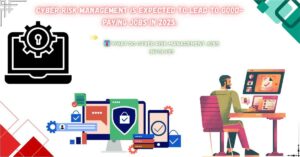A severe GCP Cloud Composer vulnerability enables hackers to exploit after they install malicious PyPI packages
The Cloud Composer tool on Google Cloud Platform shows major defect reports to its users. Attackers can take over systems all because of the GCP Cloud Composer Vulnerability which lets them use corrupted Python’s package index (PyPI) packages. This problem lets attackers enter safe systems to take control.
- This piece breaks down all parts of GCP Cloud Composer Vulnerability in basic terms. We explain the method it operates plus its relevance to users who might get affected alongside safe action strategies.
GCP Cloud Composer serves as the main subject of this text.
Google created GCP Cloud Composer as a product. The solution assists individuals in establishing automated data tasks and planned executions. This tool develops from Apache Airflow software and functions in a remote environment. Companies use GCP Cloud Composer to run their cloud-based process workflows.
- Cloud Composer enables companies to set tasks that repeat daily such as generating reports or cleaning up databases.
- Security experts have found GCP Cloud Composer Vulnerability during their research.

GCP Cloud Composer has a specific security flaw.
The GCP Cloud Composer Vulnerability represents a security issue in its system. When cybercriminals upload hacked PyPI packages to the system they force it to grant access surpassing their allowed permissions.
- The attacker who has harmful motives can gain total control over the Composer environment and perform destructive actions.
- Take charge of the Composer environment setup
- Run harmful scripts
- Steal information
Further reading suggestions:
The GCP Cloud Composer security issue may spread across its complete project system
- Attacker can harm Cloud Composer just through using bad Python packages from PyPI.
- The system problem grants attackers control over Composer when they upload harmful Python Package Repository packages.
- Explaining GCP Cloud Composer Vulnerability operations requires breaking down its process into basic actions.
- Cloud Composer lets users get Python packages from the public Python package collection.
- The attackers build a deceptive package that appears harmless but conceals harmful instructions.
- After Cloud Composer accepts the wrong Python package for installation the bad code functions.
- An attacker controls the Composer system combined with cloud account access by using this weak point.
- The threat to this weakness enables attackers to gain administrator-level control over the system.
👥 Who Is Affected by This Vulnerability?
Any person using GCP Cloud Composer runs this risk if they activate the automatic Python package installation from PyPI. Companies that process critical tasks need to protect personal or financial data from the highest risk category.
- GCP Cloud Composer presents a high danger to users with Python package installations set to automatic.
- Tech companies
- Financial institutions
- Healthcare providers
- Government data centers
🔐 How Can You Stay Safe?
Follow these critical actions to shield your systems against GCP Cloud Composer Vulnerability.
- Switch off PyPI integration unless you have complete trust in the source.
- Work with tested and approved Python packages only.
- Constant monitoring of Composer environment actions helps you find any suspicious activities.
- Constantly upgrade your Cloud Composer system.
- Follow released patchwork and security updates that Google delivers.
- Google reacted through specific actions to address this issue.
Google fast reacted once researchers presented them with the GCP Cloud Composer Vulnerability findings. The company:
- Verified the issue
- Google standardized the first set of fixes for the flaw
- The company distributed alerts and guidance to help people use Python packages safely
- Ensure you check for Composer upgrades and install them as soon as possible if you use Google Cloud Platform. Study the procedures that determine who gains entry to your system
PyPI packages become dangerous due to their deceptive behavior
Hackers construct hazardous PyPI files that seem secure until later discovery. When downloading software packages the hackers select names that are very similar to trusted applications to fool users into making changes.
After downloading the bad code it can perform actions such as:
- The attack pushes hidden information toward the cybercriminal server.
- Run harmful commands
- Establish secret administrator accounts that operate without restrictions
- Destroy files or data
- When hackers attack the GCP Cloud Composer Vulnerability they gain complete control of the affected Composer environment.

🔁 What Should Developers and Companies Do Now?
As a Google Cloud Platform developer or company you need to take these actions now.
- Audit your current packages and Composer environments
- Get rid of all installed packages that lack proof of trust
- Block unverified PyPI package installations
- Create system warnings for strange security behavior
- Teach your team about viable package handling practices
- When users online or offline install unverified packages for Google Cloud Composer the results let attackers inside.
✅ Final Thoughts
The GCP Cloud Composer Vulnerability acts as a strong wakeup call to all users. Our trusted Google Cloud Composer service contains programming mistakes that let harmful intruders access the system. Users have to watch out for unusual behavior while updating familiar security procedures and installing maintenance updates.
Further reading suggestions:
Modern safety needs for software are equal to its development requirements. You must respond to this concern immediately if your work with Google Cloud Platform (GCP).
❓ FAQs
1. The security features of GCP Cloud Composer are affected by the stability risk.
- ANS: Google Cloud Composer has a security vulnerability that permits hackers to take over installations when they use corrupted Python packages from PyPI.
2. The threat poses risks to everyone using Cloud Composer services.
- ANS: The attacker can achieve admin access to Composer and steal data while running dangerous code within the system.
3. How can I block access to this risk?
- ANS: User safety demands that you download approved Python packages and software updates for Cloud Composer plus disable automatic PyPI installations.
4. Is the vulnerability fixed?
- ANS: Google helped solve the GCP Cloud Composer Vulnerability through released security updates.
5. What makes PyPI packages containing malicious code dangerous to users?
- ANS: The packages parallel regular versions by containing secret malicious code that attacks your system.
6. Who detected the security weakness in GCP Cloud Composer?
- ANS: Security experts found this issue to Google which led to their investigation and resolution process.
7. Companies affected by this incident should take prompt action.
- ANS: Troubleshoot systems first and eliminate infected packages while following established security procedures for installation and code development.




Pingback: EU Tech Probes: 2 Big Fines for Apple and Meta
Pingback: 5 Alarming Facts About Malicious Go Modules Attacks